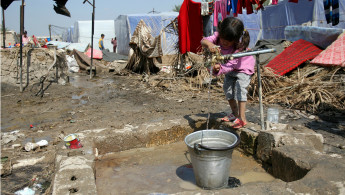Iraq cholera cases grow, spread to Kurdish region
The number of cholera cases in Iraq has risen to more than 1,800 as the epidemic spread to the northern autonomous Kurdish region, health officials said Tuesday.
"There have been 1,809 recorded cases of cholera in Iraq" since an outbreak started along the Euphrates valley last month, a health ministry statement said.
Ministry spokesman Rifaq al-Araji told AFP that the governorates of Baghdad and Babil, south of the capital, were the worst affected with more than 500 cases each.
The disease has killed six people so far, including four in the Abu Ghraib region at the very beginning of the outbreak, before health authorities had set up a response plan.
The Kurdish health ministry reported its first cases since the outbreak, two each in the provinces of Arbil and Dohuk.
Khalis Khadhr, spokesman for the regional ministry, said two of the cases were people displaced from the most affected parts of central Iraq.
The Kurdish-run governorates of Dohuk and Arbil host hundreds of thousands of people displaced by conflict from other parts of Iraq.
Authorities have blamed the cholera outbreak mostly on the poor quality of water caused by the low level of the Euphrates.
A previous outbreak had killed four people in the Kurdistan region in 2012.
After a short incubation period of two to five days, cholera causes severe diarrhoea, draining the body of its water.
The United Nations says the number of people displaced by conflict in Iraq since the start of 2014 has topped 3.2 million.





 Follow the Middle East's top stories in English at The New Arab on Google News
Follow the Middle East's top stories in English at The New Arab on Google News
![Israeli forces ordered bombed Gaza's Jabalia, ordering residents to leave [Getty]](/sites/default/files/styles/image_330x185/public/2176418030.jpeg?h=a5f2f23a&itok=_YGZaP1z)

